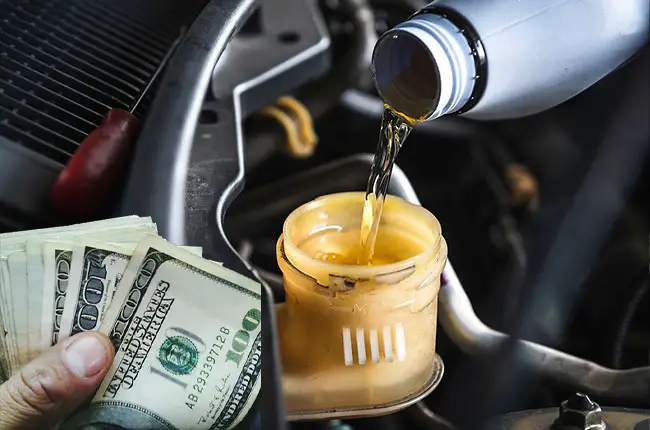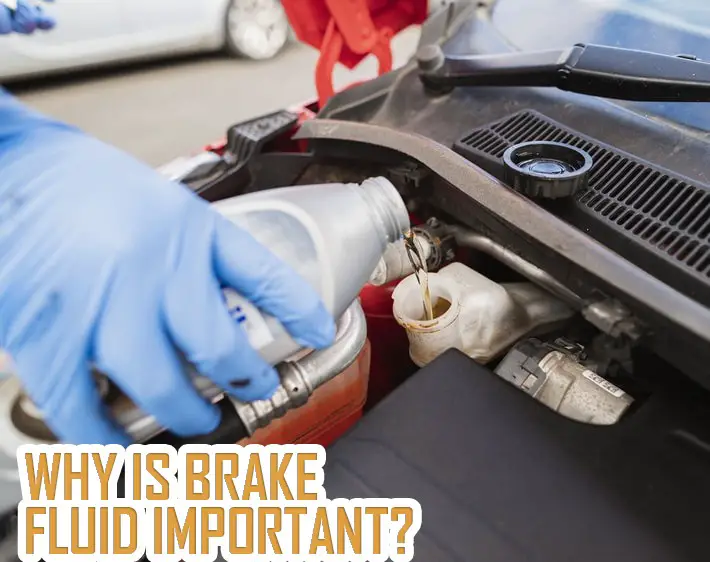How Much Does it Cost to Get Brake Fluid Change?
Do you know the importance of having your brake fluid changed regularly? It can extend the lifespan of your brakes and ensure your safety on the road. However, deciding when to get them done and how much it costs can be a headache.
It is recommended that a professional mechanic perform a brake fluid flush or fluid change, which typically costs between $80 to $130. This cost can depend on the type of brake fluid you have and whether or not you choose to do the work yourself. It is important to prioritize safety and have a professional complete this task.
In this article, I’ll guide you through everything you need to know about how much it costs to change your brake fluid. You’ll better understand what to expect from the factors affecting the price and the varying costs across different cities and auto shops.
How much does brake fluid cost?

The cost of getting a brake fluid change can vary depending on various factors, such as the location, the type of vehicle, and the service provider. On average, the cost can range from $80 to $130. However, it’s important to note that this is just an estimate, and the actual cost can be higher or lower.
Some factors that can influence the cost include:
- Vehicle type: Different vehicles may have different brake systems and fluid capacities, affecting the cost. Luxury or high-performance vehicles may require specialized brake fluids, which can be more expensive.
- Service provider: The rates charged by different mechanics or service centers can vary. It’s always a good idea to shop around and compare prices from different providers to find the best deal.
- Brake fluid type: There are different types of brake fluids available, such as DOT 3, DOT 4, or DOT 5.1. The cost can vary depending on the type of fluid recommended for your vehicle.
- Additional services can add to the overall cost if other brake-related issues or maintenance tasks are required, such as replacing brake pads or bleeding the brake system.
It’s important to prioritize safety regarding your vehicle’s brakes, as they are a critical component. Regular maintenance and fluid changes are essential for optimal brake performance and should not be skipped or delayed due to cost concerns.
Related Post: How To Prevent Brake Fluid Contamination In A Car?
Why is Brake Fluid Important?

We all know how important brakes are. After all, they’re the things that keep us from crashing into other cars, pedestrians, and fire hydrants. But many people don’t know that brake fluid is just as important as the brakes themselves.
Brake fluid makes it possible for the brakes to stop the car. Pressing down on the brake pedal forces the fluid through a narrow opening and into the brake cylinders. This pressure creates friction, which in turn causes the wheels to slow down or stop.
Without brake fluid, your car would be very difficult to stop. So, pick up a bottle of brake fluid next time you’re at the store. Your brakes will thank you for it.
How often should I get my brake fluid changed?
First, how often you should get your brake fluid changed depends on the manufacturer’s recommendations. It’s also important to consult your car’s specifications, as each make and model requires specific instructions for brake fluid changes. Brake fluid should be changed every 2 years or 24,000 miles – whichever comes first.
Remember that not all brake fluids are created equal – each has specific instructions that must be followed carefully. Consult your vehicle handbook for more information on the best way to change your brake fluid.
If you’re not experiencing any problems with your brakes, it may be safe to wait another year before changing the brake fluid. However, even if you don’t notice any issues, following the manufacturer’s recommendations for changing your brake fluid is important. Brake fluid can degrade microscopic over time, making it difficult to see this deterioration.
What are the benefits of changing my brake fluid?
Even though it might not seem like a big deal, brake fluid is a very important part of your car’s braking system. Brake fluid helps to transfer the force from your foot on the pedal to the brakes themselves. Over time, brake fluid can become contaminated with water and other chemicals, reducing its effectiveness.
That’s why it’s important to change your brake fluid regularly. Doing so can help to improve your braking performance and extend the life of your brakes. So, next time you’re at the car wash, remember to add a brake fluid change to your list of things to do.
How do I know if my brake fluid needs to be changed?
Your brake fluid should be checked regularly for the following:
– Colour is too dark
– Air bubbles or spoiled brake fluid
– Lumps or debris floating in brake fluid
– Brake fluid level is over half an inch below the maximum line.
If you notice these signs, changing your brake fluid is time. Make sure to use a brake fluid specifically for your car–DOT 3, DOT 4, or DOT 5, depending on the make and model of your vehicle. You can find this information on the brake fluid tank cap.
Flushing the system with new brake fluid ensures that all old, contaminated fluid is removed and replaced with new fluid. It’s also important to check your brakes at the mechanic to ensure they’re functioning correctly.
Which Type of Brake Fluid Should I Use?
Brake fluid is an essential part of the brake system of any vehicle. It prevents corrosion and protects the brakes by lubricating their moving parts, so it’s critical to ensure you use the right type for your car. The most common types used are DOT 3 and DOT 4 fluids; however, this will depend on your car’s particular make and model. It’s important to check with your vehicle’s owner’s manual and any indications on the top of the brake fluid filler cap as to which fluid should be used.
DOT 3 fluid can usually cope with temperatures up to 275 degrees F, while DOT 4 fluid can typically handle temperatures up to 300 degrees F or higher; however, some vehicles may require a higher temperature threshold than either option provides.
Also, if you have antilock brakes, use whichever type of brake fluid is recommended in the service manual, as this is designed specifically for them. Additionally, it is important to change out your brake fluids regularly to keep all components in optimal condition and avoid eventual breakdown due to contamination or damage from faulty high-temperature motor oils or other substances that might make their way into a brake system over time.
What Happens If You Don’t Flush Your Brake Fluid?
If you fail to maintain your vehicle’s brake fluid, you could suffer from several problems. Over time, the fluid can absorb moisture, which causes internal corrosion within the braking system that can damage seals and hoses.
Additionally, if the brake fluid isn’t drained and replaced regularly, it can become dirty and turn brown instead of clear. These contaminants are known to cause premature parts to wear and reduce overall braking performance.
Moreover, during extreme use of the brakes, such as when coming down a steep hill for an extended period, too much heat could be generated, which can cause the fluid to boil and introduce gas bubbles into what is meant to be an airtight system.
This will affect how hard you have to press on the brake pedal to get the desired effect and reduce overall stopping power. Consequently, if you neglect to flush your brake fluid, your stopping power will likely gradually diminish until it’s no longer effective.
Frequently Asked Questions
1. What are the common symptoms of low brake fluid?
Many symptoms indicate that your brake fluid needs to be replaced, but they will all be related to your vehicle’s braking system. These include: The pedal feels spongy or sinks too far down when you press it, making it difficult for you to stop your car quickly. The pedal may become stiff, making it difficult for you to stop your car.
2. What are the different types of brake fluids?
Several types of brake fluids are available, each classified based on their chemical composition and performance characteristics. The most commonly used types of brake fluids are: DOT 3: DOT 3 brake fluid is a glycol-based fluid that meets the specifications set by the U.S. Department of Transportation (DOT). It has a moderate boiling point and is widely used in most passenger vehicles and light-duty applications
3. What is brake fluid?
Brake fluid is a specialized hydraulic fluid that plays a crucial role in a vehicle’s braking system. It is responsible for transmitting the force applied to the brake pedal to the brake components, allowing the vehicle to slow down or come to a complete stop.
5. Why should I change the brake fluid?
Brake fluid needs to be changed periodically because it breaks down over time, losing its effectiveness as a lubricant and hydraulic fluid. The most common reasons for brake fluid change are: The vehicle has reached the recommended mileage for a brake fluid change. The vehicle has been driven through water (i.e., submerged).
CONCLUSION
Knowing how much it will cost to get a brake fluid change to budget and plan is important. It is also crucial to be proactive about getting this done to maintain the safety of yourself and others on the road. Be sure to consult a professional if you have any questions or concerns.
